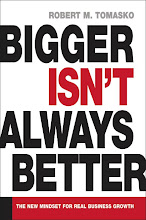February 03, 2006
Coke vs. Pepsi: growing beyond the cola wars
As happened with Dell and Apple (see Jan 16 post), the old Coke vs. Pepsi rivalry took a new turn last December when PepsiCo’s market capitalization surpassed Coca-Cola’s. According to Katrina Brooker, a senior writer at Fortune:
Why did Pepsi move forward, while Coke got stuck in the mud? Here’s how it’s explained in Chapter 3 of Bigger Isn’t Always Better:
Coke’s famous formula may have been the driver of its past glory. But it also may be a major roadblock to its future.
Link
"Losing the cola wars, it turns out, was the best thing that ever happened to Pepsi. It prompted Pepsi's leaders to look outside the confines of their battle with Coke."
Why did Pepsi move forward, while Coke got stuck in the mud? Here’s how it’s explained in Chapter 3 of Bigger Isn’t Always Better:
PepsiCo does not have an iconic product like Coca-Cola. This lack of sentimentality about its core brands has made it easier to grow its business in directions led by changing consumer tastes – Aquafina, Gatorade and snack foods. Coca-Cola, on the other hand, runs the risk of its values hardening into dogmas and its icon becoming a millstone, keeping it from pursuing the expanding markets for New Age teas, gourmet coffees, performance drinks and health beverages. Sidney Finkelstein, a Dartmouth College management professor, warns his students of the danger of learning a lesson too well. He says many business leaders have a “defining moment,” a key decision or choice they once made that has made them famous and thereafter become what they are most known for. Unfortunately many find themselves so defined by that moment that they keep trying to repeat it throughout their careers, regardless of how well it fits current circumstances. It is not that they have not learned, their problem is they have learned one thing too well. Letting go of proven past practices is a struggle, but it is a prerequisite for moving forward. As University of Michigan’s C. K. Prahalad likes to say, the “forgetting curve” may be much more important than the “learning curve.”
The opposite of letting go is “momentum thinking” – assuming what prevailed in the past will continue. Sometimes it does. If the current formula works well, and the world in which the business operates shows no sign of changing anytime soon, it is time to optimize the formula, not to set out in quest of a new direction in which to grow. But when dominating ideas are out of sync with reality, all the operational improvement in the world will not help things. And an escalating commitment to the status quo, in that circumstance, only puts the future at risk.
Coke’s famous formula may have been the driver of its past glory. But it also may be a major roadblock to its future.
Link
